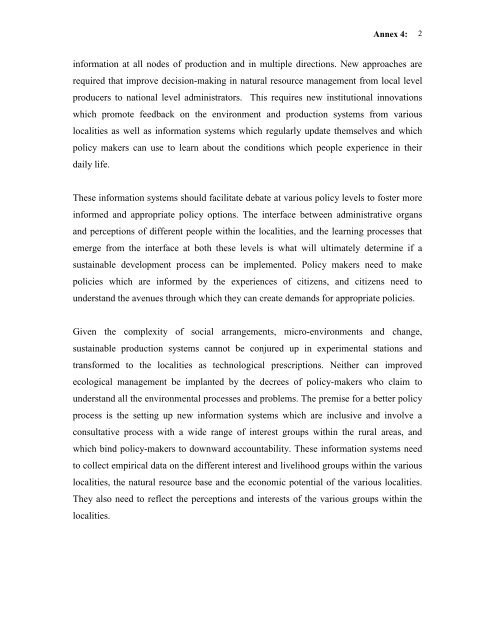Poverty Dimensions of Public Governance and Forest Management ...
Poverty Dimensions of Public Governance and Forest Management ...
Poverty Dimensions of Public Governance and Forest Management ...
Create successful ePaper yourself
Turn your PDF publications into a flip-book with our unique Google optimized e-Paper software.
Annex 4: 2<br />
information at all nodes <strong>of</strong> production <strong>and</strong> in multiple directions. New approaches are<br />
required that improve decision-making in natural resource management from local level<br />
producers to national level administrators. This requires new institutional innovations<br />
which promote feedback on the environment <strong>and</strong> production systems from various<br />
localities as well as information systems which regularly update themselves <strong>and</strong> which<br />
policy makers can use to learn about the conditions which people experience in their<br />
daily life.<br />
These information systems should facilitate debate at various policy levels to foster more<br />
informed <strong>and</strong> appropriate policy options. The interface between administrative organs<br />
<strong>and</strong> perceptions <strong>of</strong> different people within the localities, <strong>and</strong> the learning processes that<br />
emerge from the interface at both these levels is what will ultimately determine if a<br />
sustainable development process can be implemented. Policy makers need to make<br />
policies which are informed by the experiences <strong>of</strong> citizens, <strong>and</strong> citizens need to<br />
underst<strong>and</strong> the avenues through which they can create dem<strong>and</strong>s for appropriate policies.<br />
Given the complexity <strong>of</strong> social arrangements, micro-environments <strong>and</strong> change,<br />
sustainable production systems cannot be conjured up in experimental stations <strong>and</strong><br />
transformed to the localities as technological prescriptions. Neither can improved<br />
ecological management be implanted by the decrees <strong>of</strong> policy-makers who claim to<br />
underst<strong>and</strong> all the environmental processes <strong>and</strong> problems. The premise for a better policy<br />
process is the setting up new information systems which are inclusive <strong>and</strong> involve a<br />
consultative process with a wide range <strong>of</strong> interest groups within the rural areas, <strong>and</strong><br />
which bind policy-makers to downward accountability. These information systems need<br />
to collect empirical data on the different interest <strong>and</strong> livelihood groups within the various<br />
localities, the natural resource base <strong>and</strong> the economic potential <strong>of</strong> the various localities.<br />
They also need to reflect the perceptions <strong>and</strong> interests <strong>of</strong> the various groups within the<br />
localities.
















